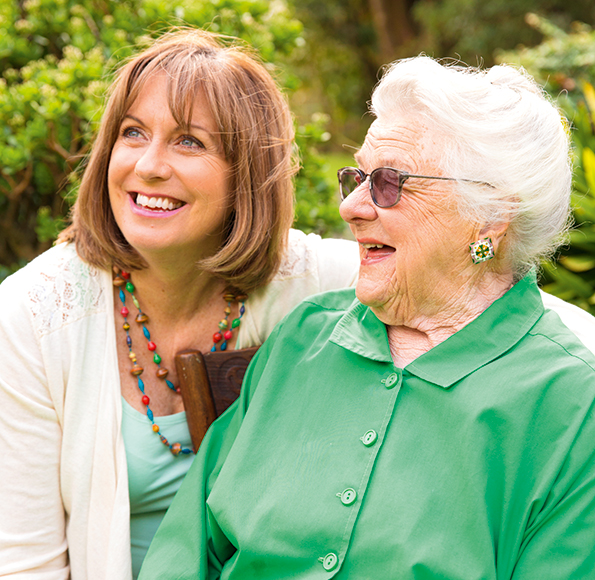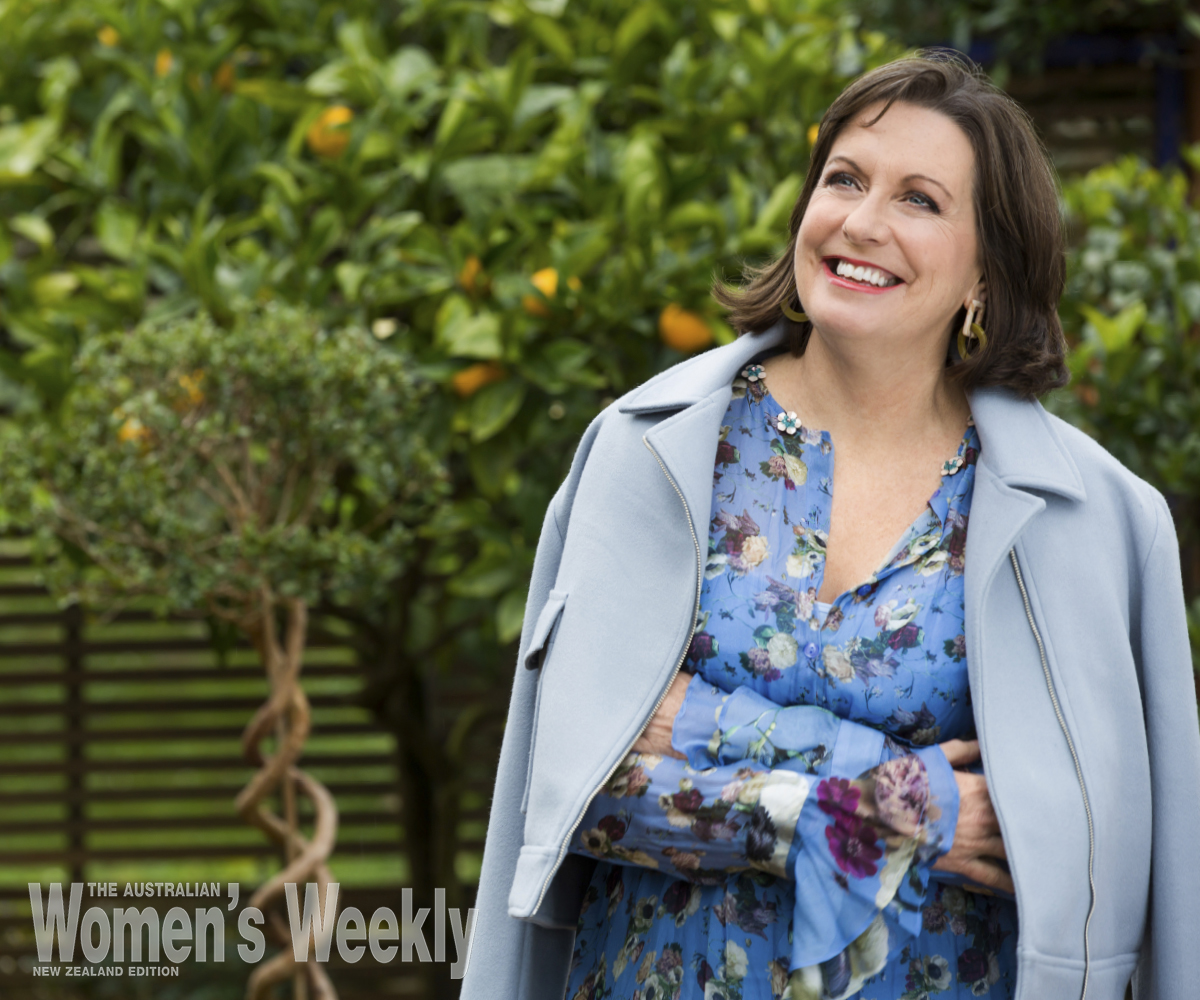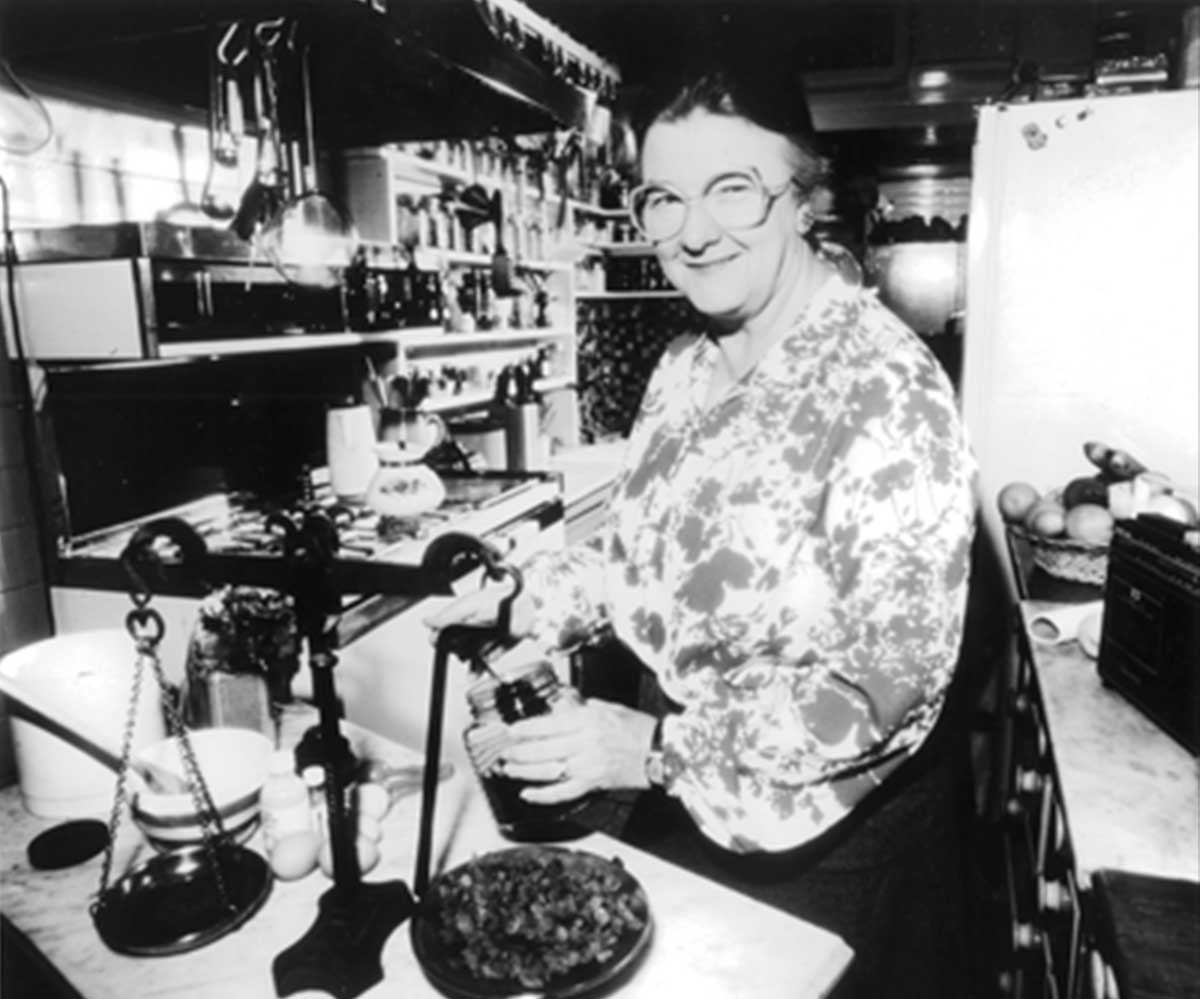“You’ll have toast with your soup, won’t you? Good girl.”
Allyson Gofton is buttering a pile of toast as we sit in the cosy kitchen of her Auckland home. Never one to turn down bread in general, I’m particularly thrilled to be well fed by one of New Zealand’s most familiar faces when it comes to food. For more than 30 years, Allyson has been helping Kiwi families make fast, delicious and healthy meals through her iconic TV show Food in a Minute, her columns in various magazines and newspapers, and her best-selling cookbooks.
Based in both Auckland and in France with her husband Warwick and their two children, Jean-Luc (15) and Olive-Rose (11), Allyson is in the midst of organising her next cookbook, a compendium on baking with all the tips and tricks that used to be passed down from one generation to another.
“Running a family and writing a book is like to trying to put a jigsaw puzzle together and you put a piece down, and you think you’ve got it in the right place, and then somebody comes in and yells at you because they can’t find their hockey stick, and then all of a sudden you can’t remember where the puzzle piece goes and it takes you two days to get back to where you were,” Allyson says drily. “It would be fantastic if I could just sit around and shut the world out for three months, but it’s not possible.”
Case in point: 15 minutes into our interview, a young dietitian, who has come to talk about working on the new cookbook, turns up, so we pause our chat while Allyson runs what might be the world’s loveliest job interview – so lovely, in fact, that the dietitian ends up staying for soup and toast as well. This, it turns out, is very Allyson – warm, kind and approachable.

Her kitchen is a home cook’s haven; I count 75 spices in her pantry. (“Did you also spot that they’re in alphabetical order?”)
If this is the treatment we almost-strangers get, it would be fair to assume that the Gofton household is a hotbed of social activity, and during the good times that would be true. But the past 18 months have been so difficult for the family to manoeuvre their way through that they have, as Allyson puts it, “gone to ground”.
In 2016, the family were about to head off on one of their regular pilgrimages to their house in the rural French village of Caixon, to stay for the winter season. They had already sent their things over, when one of those instant, life-changing moments hit. Jean-Luc, aged 13 at the time, was playing hockey when he took a bad hit while trying to get past the goalie.
“He still got the goal, he tells everyone,” Allyson says. “He came home, and said, ‘Oh, I got a really big hit, Mum,’ but we didn’t think anything of it, because he’d got straight back up and kept playing.”
But the next week Jean-Luc’s behaviour was uncharacteristically off, and Allyson and Warwick found themselves being called in to talk to his school.
“We thought, ‘That’s not like him.'”
The week after that, Jean-Luc was having a bath and Olive-Rose went to bang on the door and tell him dinner was ready, before coming downstairs to tell her parents that he’d fallen asleep. “My husband grumbled ‘typical teenager’ and went to wake him up. The next thing I heard was, ‘Get the ambulance.'”
Jean-Luc had passed out in the bath and when they did manage to wake him, he couldn’t recognise his family. They took him to the hospital, tests were run, they were told he was fine, so they brought him home. And then they couldn’t wake him when he went to sleep. And then he was struck by terrible headaches. And then he started fainting. “His brain decided it couldn’t cope with any stress, which meant any changes in light, noise, smell – life in general. If you changed the TV channel or the commercials came on, Jean-Luc would pass out. If he was standing, he just dropped. If he was going up the stairs, he’d fall. He couldn’t shower without one of us being in the room.”

Allyson with Warwick and the children at the home they rented in France in 2013.
They had a couple more call-outs to the hospital, one of which took an even darker turn. Allyson and Warwick were told that Jean-Luc might have Non-Epileptic Anxiety Disorder, and they were separated by the hospital for questioning.
“At that point, we started to feel very threatened and very much as if we had caused this trouble to our son. We were beside ourselves. I understand that hospitals must do this, because they see such a range. But we were told: ‘You’re putting too many expectations on your child… this is what is causing your son to pass out.’ We had no idea what to do. I ended up at a neighbour’s house in tears saying, ‘I have no idea what I’ve done to my son.'”
It was from two unexpected sources that they finally started to get some answers.
“Our cleaner came in and saw him one day and said, ‘Has he got concussion?’ She’d been an endocrinologist back in Russia. We rang the concussion clinic closest to us and they told us they had an appointment in six weeks. Warwick told them, ‘I don’t think you understand, we’re on our way now.'”
They got a diagnosis of concussion, but there still wasn’t much assistance, until a friend dropped by with his sister, who happened to work for another concussion clinic.
“She got us accepted into ACC. We went to that clinic instead, and from then on it all changed: we got the best treatment, ACC were fantastic, and we saw a neurologist who gave us a completely different diagnosis [from that given to them in the hospital]. They told us, ‘You are not involved in this – it’s a reaction from his concussion.'”
Allyson and Warwick cancelled their trip to France and pulled Jean-Luc out of school.
“We home-schooled him a bit, but most of the time he would just sleep – and when he went into the deep sleeps, we couldn’t wake him.” Jean-Luc had to be retaught the basics: how to hold a pen, how to write. Not being in school gave him time to rest, but meant that he became isolated from his friends.
“He’d go back to school on the odd morning but the friends had moved on. You’re trying to put your life into some kind of order, some kind of normality, and you’ve got a kid that continues to pass out. You can’t have any kind of plan.”

Olive-Rose and Jean-Luc on a visit to Auckland Zoo in July this year.
This continued for four months, through Christmas 2016 and into the new year, and then things slowly improved. The neurologist gave Jean-Luc the all-clear and the family headed off to their other home in France. Olive-Rose settled back into her French-speaking school, but Jean-Luc struggled with his; the endless translating his brain had to do was too tough, and he started passing out again. So they came home.
“It’s been an enormous learning curve,” Allyson says. “We’ve had to take our foot off the pedal in terms of any plans as a family, which is absolutely fine. We just had early nights, and very set activities, until he got well.”
It took about 18 months all up; they saw him improve at the end of the first term this year. Jean-Luc needed an environmental change, a fresh start, so they trialled him at a boarding school in Cambridge, which he loves.
“He’s gone back to sport – people think we’re a bit mad on that one, but he’s a young boy, he has to be fit. But I can see that he’s lost that fearlessness. He got a fright. But he’s learned a lot from it. He learned something about his body. He learned that sometimes in your life, you have to make really big decisions when one of your family members is hurt. We didn’t leave his side – whether that was right or wrong, we don’t know. But he was safe. That was the important thing.”

There were still more learning curves to come for the family, however. Olive-Rose was diagnosed with having dyslexia. Needing a school that better understood the condition, they shifted her.
Interestingly, in the French school system, she flourishes – their curriculum is still very old-school in comparison to New Zealand, where the children do a lot of digital learning on computers or tablets.
“I’m an old mother, and I understand that, but what on earth happened that they can’t hold a pen and paper? There is a hand-to-eye connection that happens in the brain when you do that, which doesn’t happen with a computer. In France, they also have longer school days and no homework. Homework is just an argument for parents.”
Warwick and Allyson had both their children through IVF; Jean-Luc was from their first round, but it took several years after that to conceive with Olive-Rose. The couple both so desperately wanted children and their son and daughter are clearly the blessings of their lives. But, Allyson says honestly, it is not an easy road.
“For the first time since having my children, I now appreciate the amount of effort I have to have to keep up with an 11-year-old girl. I didn’t feel it with Jean-Luc, but I do feel it tremendously with Olive-Rose. I feel old, an old mother, when I’m with her friends’ parents. Children don’t see you as old – I had older parents, and I never saw them as old. But I am now realising that having children after 40 is fantastic, and it’s a miracle, and it’s wonderful, but the one thing I’d pass on to any young couple is that after 40, it does get much harder. Olive-Rose is 11, and I’m 57. Sometimes I’m tired. Sometimes I’m really tired. I notice that quite strongly.”
After the births of both children, Allyson suffered from postnatal depression and is very open about the fact that her mental health is something she has to work at to maintain. “I know the pitfalls, so I watch my health. It doesn’t mean that you’re going to turn into someone else, it just means that whatever the stressors are, or whatever is happening in your life, you’ve reached the end of your ability to cope. And whether people see that as a failing, that’s the bit I want them to understand: you’re not failing. If you had a heart attack, you would take a tablet. If you’re struggling with a mental health issue, you should reach out. It just means you recognise that you need assistance – and that others around you realise you just need some time.” During the stress of last year, Allyson checked back in with the doctor she’s always gone to when she needs help.

Allyson with her friend and mentor Tui Flower.
On top of their family crisis, there was still more to deal with during that time: Allyson had lost several friends to illness, including her mentor and surrogate grandmother, Tui Flower. Tui was an icon of the New Zealand food and magazine world, who hired Allyson more than 20 years ago for a job with the New Zealand Woman’s Weekly test kitchen.
Allyson admits she was terrified of Tui at first, but they become close friends, and one silver lining of the family coming back from France unexpectedly was that it meant Allyson was able to spend time with her old friend before she died.
Right up until the end, she was the same Tui she always was: pedantic, a stickler for doing it right, kind, funny.
“We had a wonderful, loving friendship,” Allyson says. “When I was in hospital with both my children, she would make Warwick go round and pick up the asparagus rolls and scones that she would make me every other day. I consider myself very lucky to have been picked up by Tui.”
Allyson was on “clean-out duty”, along with Tui’s friends and family, of the Mt Eden property where members of the Flower family had lived for over 100 years. It was a house full of family treasures: a cross from a brother’s grave after the war, Tui’s sewing samples she’d done at high school.
“A lovely trip down memory lane of a different time. Tui – like people of her generation – had lived through the Depression, and then the war, so they knew things were precious and you didn’t throw them out.”
Allyson was gifted many personal items from Tui: some of her tapestries, the vintage biscuit moulds, her book collection. Every Christmas, their family garden blooms with lilies that Tui gave them.

Allyson and family have been in their Auckland home since 2000 but there are vague plans to move, perhaps down to Cambridge to be closer to Jean-Luc’s school, and also for Olive-Rose, a keen horse-rider. The relentless pace in Auckland is becoming too much – the glaring contrast between high-speed city life and the slower, simpler lifestyle in France growing greater every time they come home.
Allyson still has plenty of work up her sleeve – there’s this new cookbook, out next Mother’s Day, with plans for more to follow. There’s a concept for a TV show she’s been mulling over, but she might wait until Olive-Rose is a bit older. She’s wary of the fact that a lack of time means home cooks are paying through the nose under the guise of convenience, and bemoans the price – and prepackaged nature – of basic ingredients (don’t get her started on pre-cut cauliflower). But mostly, she and her family are looking for a simpler life after an unbelievably turbulent couple of years.
“With age comes the recognition of the preciousness of life. I’ve lost a number of girlfriends to cancer, and I’ve lost Tui, who was my mentor. There is an understanding of what’s important – and our kids are the most important thing,” Allyson says.
But the bad times help shine a spotlight on the good times when they come around again – and they always do.
“You learn to appreciate the other things in life that you might not necessarily appreciate: a bit more time. A bit more sun. And I don’t worry about eating chocolate now! I say, ‘Oh, I think I need chocolate. It’s a chocolate day.'”


